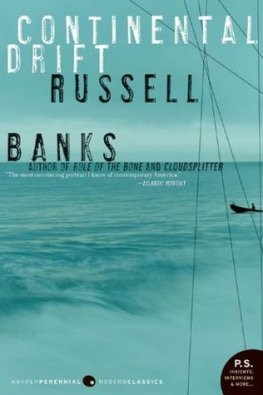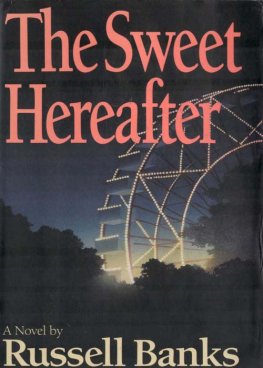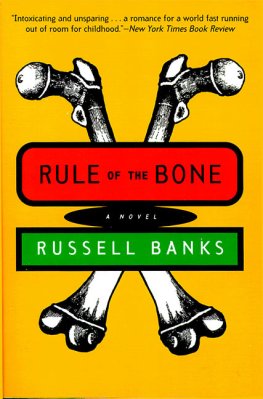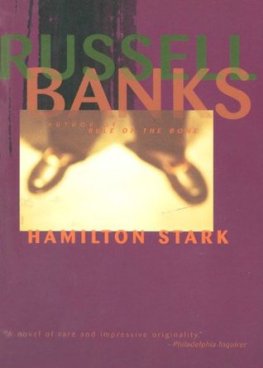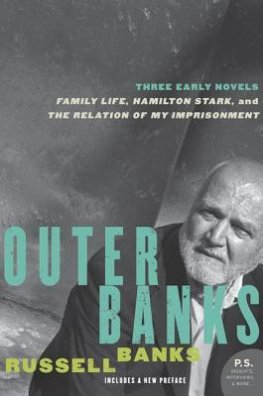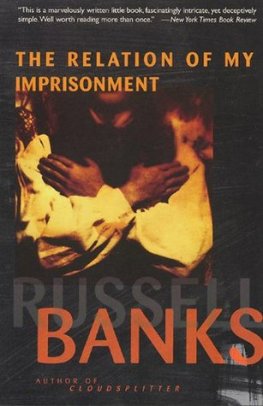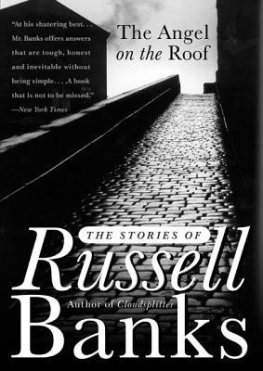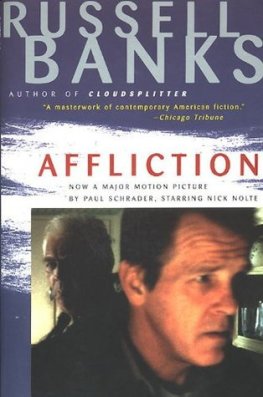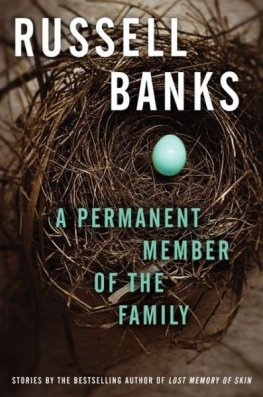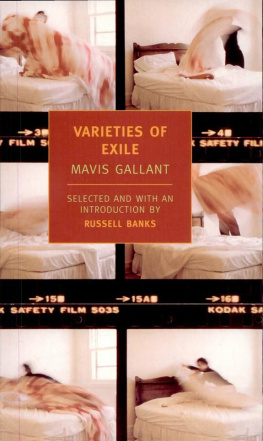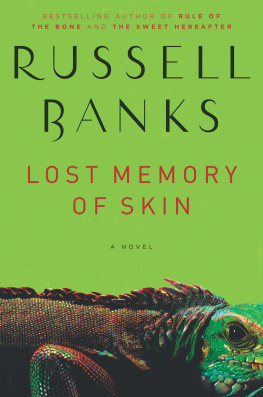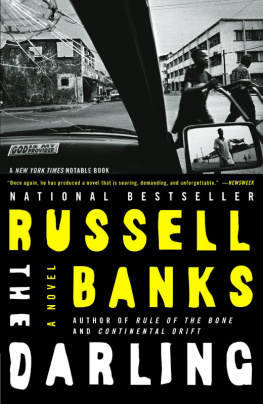Russell Banks
Continental Drift
for Kathy
Yun seul dwt pas capab mang gombo.
I am free. High above the mast the moon
Rides clear of her mind and the waves make a refrain
Of this: that the snake has shed its skin upon
The floor. Go on through the darkness. The waves fly back.
Wallace Stevens, Farewell to Florida
Harpers Creek and roarin ribber,
Thar, my dear, well live forebber;
Den well go de Ingin nation,
All I want in dis creation Is pretty little wife and big plantation.
Northrup, Twelve Years a Slave

Its not memory you need for telling this story, the sad story of Robert Raymond Dubois, the story that ends along the back streets and alleys of Miami, Florida, on a February morning in 1981, that begins way to the north in Catamount, New Hampshire, on a cold, snow-flecked afternoon in December 1979, the story that tells what happened to young Bob Dubois in the months between the wintry afternoon in New Hampshire and the dark, wet morning in Florida and tells what happened to the several people who loved him and to some Haitian people and a Jamaican and to Bobs older brother Eddie Dubois who loved him but thought he did not and to Bobs best friend Avery Boone who did not love him but thought he did and to the women who were loved by Bob Dubois nearly as much as and differently from the way that he loved his wife Elaine. Its not memory you need, its clear-eyed pity and hot, old-time anger and a Northern mans love of the sun, its a white Christian mans entiwned obsession with race and sex and a proper middle-class Americans shame for his nations history. This is an American story of the late twentieth century, and you dont need a muse to tell it, you need something more like a loa, or mouth-man, a voice that makes speech stand in front of you and not behind, for theres nothing here that depends on memory for the telling. With a story like this, you want an accounting to occur, not a recounting, and a presentation, not a representation, which is why its told the way its told. And though you, too, may see it with your own eyes and hear it with your own ears as if you, the teller of the tale, sat in the circle of listeners, attentive, hoping to be amused, amazed and moved yourself you still must see it with eyes not your own and must tell it with a mouth not your own. Let Legba come forward, then, come forward and bring this middle-aging, white mouth-man into speech again. Come down along the Grand Chemin, the sun-path, all filled with pity and hardened with anger to a shine. Come forward, Papa, come to the Crossroads. Come forward, Old Bones, full of wonder for the triple mystery of men and women clamped to one another, of blackness and of the unexpected arrival of gods from Guinea. And come forward eager to cast shame all about. Give body and entitledness and boldness to this white mouth-mans pity and anger by covering his shoulders with a proper cloak of shame, and give him pure, physical pleasure under the slow, close sun among people and gods whose evident difference from him and from his one big God brings him forward too, finally, unto himself and unto everyone present as well. And let this man tell what the good American man Bob Dubois did that was so bad in the eyes of God and les Mystres and in the eyes of the mouth-man himself that Bob Dubois got left lost to his wife Elaine, who had loved him for a long, long time, and his son and two daughters and his friend Avery Boone and the women Bob Dubois had made love to and the men and women who had lived and worked with Bob Dubois in Catamount, New Hampshire, and in Oleander Park, Florida, and on fishing boats out of Moray Key. Again, Legba, come forward! Let this man speak that man to life.

1
Its December 21, 1979, a Friday, in Catamount, New Hampshire. Its late in the day, windless and cold, bits of snow dropping from a dark, low sky. At this latitude at this time of year, the sun sets at three forty-five, and Catamount, a river town laid north and south between a pair of glacial moraines, settles quickly without twilight into darkness. Light simply gets replaced by cold, and the rest remains the same.
A half foot of old crusty snow has covered the ground since the first week of the month, followed by days and nights of dry cold, so that the snow has merely aged, turning slowly gray in yards and on rooftops and in heaps alongside the streets, pitted and spotted along sidewalks and pathways by dogs and mottled everywhere with candy wrappers, beer cans and crumpled cigarette packs. The parking lots and sidewalks, plowed and salted weeks ago, are the color of ash, so that new snow gently falling comes as a cleansing fresh coat of paint, a whitewash that hides the old, stained and tainted world underneath.
Robert Raymond Dubois (pronounced locally as Doo-boys), an oil burner repairman for the Abenaki Oil Company, walks slowly from the squat, dark brick garage where he has parked the company truck, walks hunched over with careful effort, like a man in a blizzard, though snow is falling lightly and there is no wind. He wears a dark blue trooper coat with a fur collar, and a black watchcap. In one hand he carries a black lunchbox, in the other an envelope containing his weekly paycheck, one hundred thirty-seven dollars and forty-four cents.
Dubois thinks, A man reaches thirty, and he works at a trade for eight years for the same company, even goes to oil burner school nights for a year, and he stays honest, he doesnt sneak copper tubing or tools into his car at night, he doesnt put in for time he didnt work, he doesnt drink on the job a man does his work, does it for eight long years, and for that he gets to take home to his wife and two kids a weekly paycheck for one hundred thirty-seven dollars and forty-four cents. Dirt money. Chump change. Money gone before its got. No money at all. Bob does not think it, but he knows that soon the man stops smiling so easily, and when he does smile, its close to a sneer. And what he once was grateful for, a job, a wife, kids, a house, he comes to regard as a burden, a weight that pulls his chin slowly to his chest, and because he was grateful once, he feels foolish now, cheated somehow by himself.
Dubois parks his car on Depot Street facing downhill toward the river and tight to the tailgate of a salt-covered pickup truck. Its snowing harder now, steadily and in large, soft flakes, and the street is slick and white. Black footprints follow him across the street to a brick building where there are apartments in the upper two stories and a used clothing store, a paint store and a bar at street level, and he enters the bar, Irwins Restaurant and Lounge. The restaurant is in front, a long, narrow room the size of a railroad car, filled with bright green plastic-covered booths and Formica-topped tables. The room is brightly lit and deserted, but in back, through an archway, the bar is dark and crowded.
The bartender, a muscular woman in her mid-fifties with a beerbarrel body and a large, hard, lipsticked mouth and a mass of bleached blond hair arranged carefully to resemble a five-and-dime wig, greets Dubois and shoves an opened bottle of Schlitz across the wet bar to him. Her name, unbelievably, is Pearl, and she is Irwins help. In a year Irwin will die of a heart attack and Pearl will buy out his estate and will finally own the business she has run for decades.

